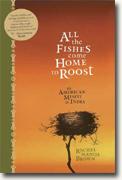All the Fishes Come Home to Roost
Rachel Manija Brown
book reviews:
· general fiction
· chick lit/romance
· sci-fi/fantasy
· graphic novels
· nonfiction
· audio books
· author interviews
· children's books @
curledupkids.com
· DVD reviews @
curledupdvd.com
newsletter
win books
buy online
links
home
for authors
& publishers
for reviewers

 |
All the Fishes Come Home to Roost: An American Misfit in India Rachel Manija Brown Rodale Paperback 352 pages October 2006 |
|
In the course of writing another review for Curled Up with a Good Book (He Gives the Ocean by Najoo Savak Kotwal), I mentioned Rachel Manija Brown's book, All the Fishes Come Home to Roost
While both books treat with a similar subject life in and around the ashram of Meher Baba, a noted Indian spiritual master and both are written from a female perspective and include childhood memories they are as different as chalk and cheese. Equally useful and enjoyable, but with radically different purposes. Kotwal's book is pietistic, written from the point of view of an Indian child growing up in the 1940s in an extended family completely devoted to Meher Baba in the tradition of the guru/disciple relationship that is well understood in the East. Rachel Manija Brown, by contrast, was a happy little American kid growing up in L.A. when her mother, with her somewhat passive father's assent, suddenly decided to move the family to India and live in Meher Baba's ashram in the 1970s. Named Manija after one of Baba's close disciples, the girl already had a major strike against her socially. No one could pronounce her name (she took the name Rachel after she grew up). Manija's mother was smitten with Meher Baba from the first time she saw his picture, and later became an unquestioning virtual servant to one of Baba's closest disciples, a man whom Brown calls Firoze in her book. By the time Manija and her parents moved to Ahmednagar, a large military town of little consequence in the Deccan area of western Maharashtra State, Meher Baba had passed away. Attaching oneself to one of his close family or long-time disciples was deemed an excellent way to express one's devotion. As a result of her mother's piousness (constantly repeating "Baba, Baba, Baba" in the face of any emergency) and her father's adroit philosophical take on things that allowed him to ignore reality, Manija was neglected. She was sent to a Catholic school in Ahmednagar where she endured corporal punishment by the nuns and endless taunts from her schoolmates, who apparently hated her simply because she was different. Reporting to her mother about the goings-on at school yielded little more than an exhortation to "be happy, don't worry" as Meher Baba always advised, to look at her sufferings from the perspective of God's will instead of from the insecurity of a bright child trapped in alien circumstances, and to take an aspirin. Manija's saving graces were two: she was strong-willed, and she was unusually intelligent. She devised games to play alone and did not give in to the norms of the ashram any more than was necessary to keep peace with her parents. When she was in her mid-teens, her father returned to the U.S., and she used a newly found talent writing to bombard him with letters pleading to be allowed to live with him. She finally won her struggle. Rachel Manija Brown is careful not to insult or denigrate Meher Baba or his followers in this her first book. In general, she plays the whole absurd situation for laughs, making us smile, sometimes a little painfully, along with her. She maintains a respectful if distant attitude toward most of the Baba crowd, including Firoze, despite her own acknowledged lack of a "God magnet" a lack which has made it impossible for her to embrace the religion that her parents so enthusiastically introduced her to. The problem was, her parents simply assumed she would love and revere Meher Baba as readily as they did. No one consults kids about such things, so her feelings were largely lost in the shuffle. Now, with her fascinating memoir, "all the fishes" have "come home to roost." Originally published on Curled Up With A Good Book at www.curledup.com. © Barbara Bamberger Scott, 2008 |
|
|
|
 Click here to learn more about this month's sponsor! |
|
| fiction · sf/f · comic books · nonfiction · audio newsletter · free book contest · buy books online review index · links · · authors & publishers reviewers |
|
| site by ELBO Computing Resources, Inc. | |
 So now, I've read Ms. Brown's book and I can honestly, and fairly, say what I think about it.
So now, I've read Ms. Brown's book and I can honestly, and fairly, say what I think about it.